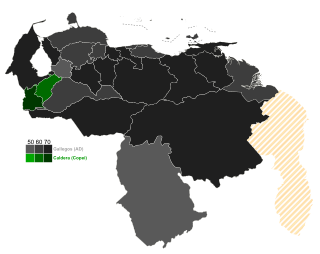Related Research Articles

The politics of Venezuela are conducted under what is nominally a federal presidential republic, but is in practice an authoritarian system of government. Prior to the early 1990s, Venezuela was considered an unusually long-standing and stable liberal democracy in Latin America, having transitioned to democracy in 1958. According to the V-Dem Democracy indices Venezuela was in 2023 the third least electoral democratic country in Latin America.

The National Action Party is a conservative political party in Mexico founded in 1939. It is one of the main political parties in the country, and since the 1980s has had success winning local, state, and national elections.

Democratic Action is a Venezuelan social democratic and centre-left political party established in 1941. The party played an important role in the early years of Venezuelan democracy, leading the government during Venezuela's first democratic period (1945–1948). A decade of dictatorship under Marcos Pérez Jiménez followed, which saw AD excluded from power. With the advent of democracy in 1958, four Presidents of Venezuela came from Acción Democrática from the 1950s to the 1990s during the two-party period with COPEI.

COPEI, also referred to as the Social Christian Party or Green Party, is a Christian democratic party in Venezuela. The acronym stands for Comité de Organización Política Electoral Independiente, but this provisional full name has fallen out of use. The party was influential during the twentieth century as a signatory of the Puntofijo Pact and influenced many politicians throughout Latin America at its peak.

Parliamentary elections were held in Venezuela on 4 December 2005 to elect the 167 deputies to the National Assembly of Venezuela, twelve deputies to the Latin American Parliament and five deputies to the Andean Parliament. Several days prior to the elections, five opposition parties unexpectedly withdrew, shortly after a dispute over the voting process had apparently been resolved with the support of the Organization of American States (OAS). The opposition had been expected to get around a third of the Assembly seats, or even less; the withdrawal meant the opposition were scarcely represented in the parliament at all, as the opposition parties which did not withdraw failed to win any seats. 114 seats went to the President's Fifth Republic Movement (MVR) – up from 86, with the remaining 53 going to "smaller pro-Chávez parties as well as to independents and representatives of some social groups that support the government".

Francisco Javier Arias Cárdenas is a Venezuelan politician and career military officer, and was the governor of Zulia state. He participated in Hugo Chávez's unsuccessful February 1992 coup attempt, being pardoned in 1994 by Rafael Caldera, along with the other conspirators. He was elected Governor of Zulia state in 1995 for the Radical Cause, and challenged Hugo Chávez for the presidency in 2000. He subsequently served as Venezuelan Ambassador to the UN, and deputy to the National Assembly after the 2010 parliamentary elections.
The Venezuelan Popular Union was a political party in Venezuela. The UPV was built along 'Browderist' pattern. UPV had its roots in the Municipal Union (UM), which had been legalized in 1941 and had functioned as a legal cover for the underground Communist Party of Venezuela. The party was founded on March 13, 1944, through the merger of the Municipal Union of the Federal District, the Zulian Unification League and eleven state-level 'People's Unions'. The decision to form UPV as a political party was taken at the Fourth National Conference of the Communist Party of Venezuela.
Claudio Eloy Fermín Maldonado is a Venezuelan politician and sociologist. He was deputy minister of youth under Jaime Lusinchi, and subsequently Mayor of Libertador municipality, Caracas (1989–1993) for Acción Democrática, narrowly missing out on re-election to La Causa Radical's Aristóbulo Istúriz. He was the AD candidate in the 1993 presidential election, coming second with 24% of the vote.
The Regionalist Party of Cantabria is the second oldest political party in the Spanish Autonomous Community of Cantabria. The PRC originated in the Association in Defense of the Interests of Cantabria (ADIC), founded on 14 May 1976, with the objective of promoting Cantabrian autonomy.
The Democratic Republican Union is a Venezuelan political party founded in 1945.

General elections were held in Venezuela on 14 December 1947. The presidential elections were won by Rómulo Gallegos of Democratic Action, who received 74.3% of the vote, the largest presidential win in Venezuela's modern history. His party won 83 of the 110 seats in the Chamber of Deputies and 38 of the 46 seats in the Senate.

The Democratic Unity Roundtable was a catch-all electoral coalition of Venezuelan political parties formed in January 2008 to unify the opposition to President Hugo Chávez's United Socialist Party of Venezuela in the 2010 Venezuelan parliamentary election. A previous opposition umbrella group, the Coordinadora Democrática, had collapsed after the failure of the 2004 Venezuelan recall referendum.
¡Aquí Está! was a Venezuelan weekly newspaper, the central organ of the Communist Party of Venezuela. ¡Aquí Está! was founded in 1942 by Miguel Otero Silva, as the Venezuelan political climate was liberalized under Isaías Medina Angarita. ¡Aquí Está! substituted the previous Communist Party organ El Martillo, which had been re-launched in 1938. ¡Aquí Está! was marked by a 'Browderist' editorial line. Apart from Otero Silva, other editors of ¡Aquí Está! were Carlos Augusto Léon and Ernesto Silva Tellerías. The newspaper was published from Caracas. Through ¡Aquí Está! the Communist Party was able to win a considerable influence over the urban intelligentsia.
Parliamentary elections were held in Venezuela on 6 December 2020. Aside from the 167 deputies of the National Assembly who are eligible to be re-elected, the new National Electoral Council president announced that the assembly would increase by 110 seats, for a total of 277 deputies to be elected.
The Revolutionary Party of the Proletariat (Communist) (Spanish: Partido Revolucionario del Proletariado (Comunista), abbreviated P.R.P.(C)), nick-named 'the Black Communists', was a political party in Venezuela 1947-1952.
Elections to local municipal councils were held across Venezuela on May 9, 1948, except for the Federal District and the Federal Territories were local authorities had been elected in December 1947. These were the first municipal elections with direct universal and secret suffrage held separately from the national presidential or legislative elections.

The Democratic Alliance was a political coalition created to face the government of Nicolás Maduro in the 2020 Venezuelan parliamentary election and grouped in the National Assembly. It is made up of Hope for Change, Cambiemos and Progressive Advance parties of the predecessor coalition Agreement for Change, in addition to the intervened parties Democratic Action and Copei, and the later incorporated Primero Venezuela, United Venezuela, Ecological Movement, Unidad Vision Venezuela, Country Commitment and the also intervened Popular Will.
References
- 1 2 Boris Bunimov-Parra (1968). Introducción a la sociología electoral venezolana. Editorial Arte. pp. 68, 74.
- ↑ Manuel Vicente Magallanes (1973). Cuatro partidos nacionales: Acción Democrática, Copei, Partido Comunista de Venezuela, Unión Republicana Democrática. Diana, Artes Gráf., Madrid. p. 148. ISBN 978-84-7156-142-8.
- ↑ John D. Martz (8 December 2015). Accion Democratica: Evolution of a Modern Political Party in Venezuela. Princeton University Press. pp. 75–76. ISBN 978-1-4008-7587-0.
- ↑ Rodolfo Quintero; Universidad Central de Venezuela (1973). Estudio de Caracas. Ediciones de la Biblioteca. p. 149.
- ↑ Rafael Arráiz Lucca (15 February 2016). El «trienio adeco» (1945-1948) y las conquistas de la ciudadanía. Editorial Alfa. p. 126. ISBN 978-84-16687-12-1.